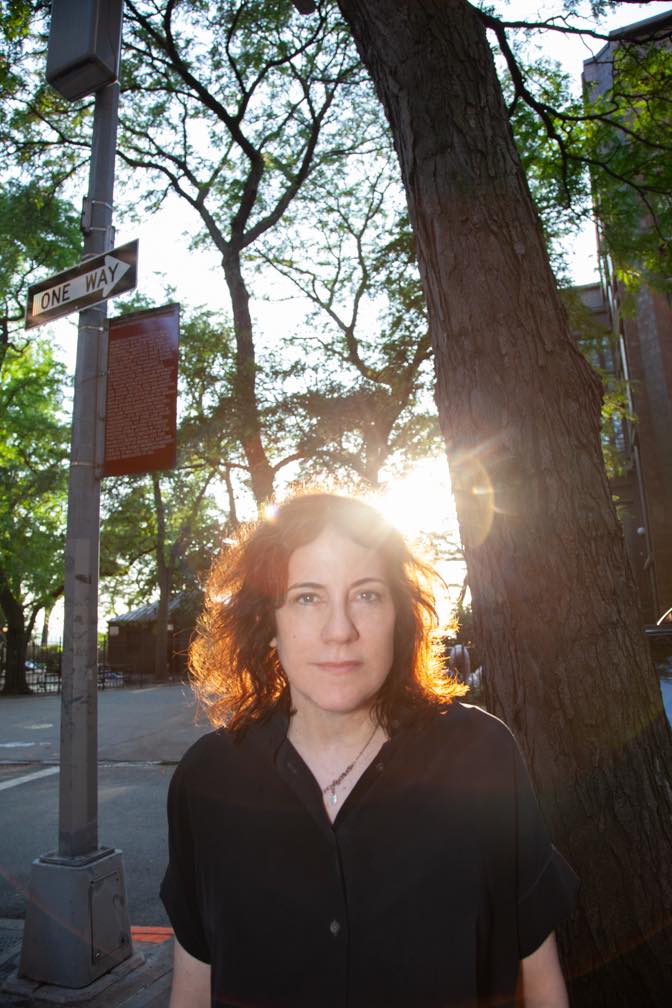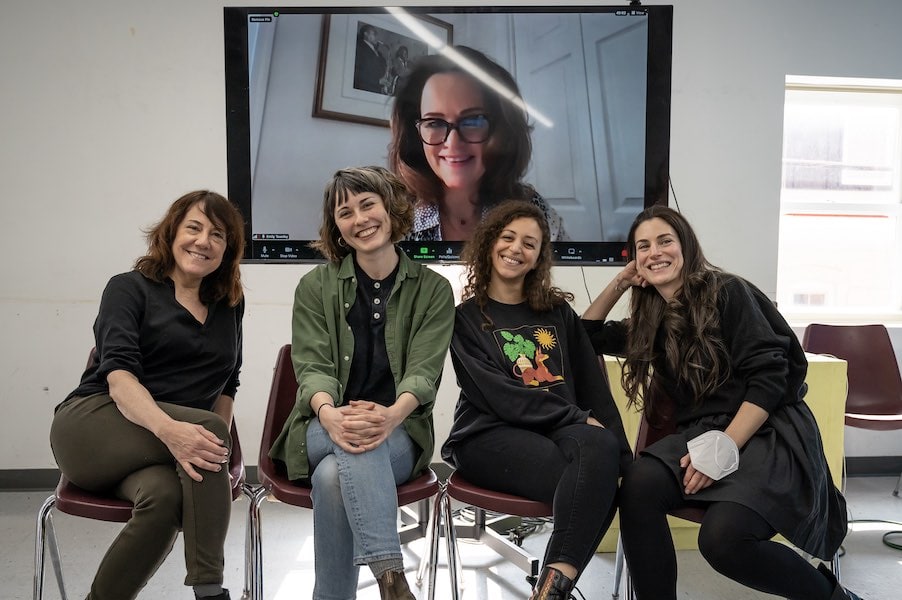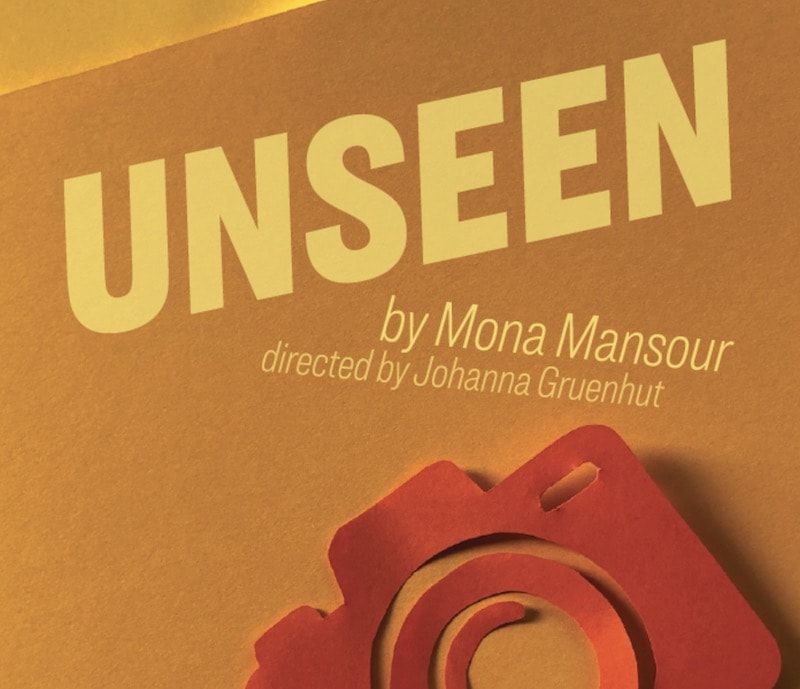Unseen, the new play by Mona Mansour that opens at Mosaic Theater this week, is a sharp-edged thriller set in the fragile world of today’s Middle East.
On its surface, it’s the story of a “conflict photographer”—a strange euphemism for what in fact is a photojournalist working in a war zone—and it begins with her waking up, unaware of where she’s been or what she’s seen, in the apartment of a former girlfriend in Istanbul.
Mia, the photographer who can’t remember how she got there, is an American; Derya, her rescuer and one-time lover, is Turkish.
Together, they try to piece together the story of what happened. But it’s not easy.
“It’s hard to tell a story when there are no answers,” Mansour told me, as we settled in for a two-part telephone interview prior to rehearsals.
One reason that there are no answers is that the characters in Unseen—Mia and Derya; Mia’s mother, Jane; her mentor, her editor, and the mothers of the dead—are all carefully nuanced.

“Unseen is full of the complexities that motivate people,” Mansour said. “Arab Americans are often depicted as clichés. They’re either terrorists or bodega owners, cab drivers or imams. I want to disentangle the stereotypes.
“In my experience,” she added, “a lot of Arab Americans are like Derya, the woman in whose apartment Mia finds herself. They’re modern Muslims and they’re like most Christians. They’re devout, but they party a lot. They drink and have sex, straight or gay. They’re complicated.”
Although Mia is linked, almost viscerally, to her camera, the play is not about photography. Instead, according to Mansour, it’s about empathy, or the lack of it, that blinds us to the truth.
In the play, space and time are fluid. Mansour finds that very natural since that’s what memory is like. It’s also a way of building suspense, and far more dramatic than a chronological approach.
“What would you like audiences to take away from Unseen?” I asked.
Mansour’s answer was succinct. “The humor, the loss, and the complexity,” she said.
“On the one hand,” she explained, “the play has a lot of humor in it. It’s like life. Humor allows us to live with complicated relationships. It’s how people get through difficult times.
“On the other hand, there is loss. There’s a cost for not looking at the truth, about not seeing the things that we don’t want to see. The play questions what we block out or forget. But the camera forces us to remember. It provides a link to what we have ignored.”
Mia embodies the humor, the loss, and the complexity. “She is not perfect, but she is funny,” Mansour said. Mia is an American journalist who documents the front line—the battles, sieges, and massacres—that must be recorded. But looking through the camera and failing to see the meaning is a metaphor for nihilism.
Unseen, which had its first production in Chicago in 2017, marks a welcome return to Mosaic, where Mansour’s award-winning The Vagrant Trilogy had its world premiere five years ago.
While the Trilogy is about the toll of exile, Unseen is about the terrible cost of forgetting—or, worse yet, not seeing at all—the consequences of our actions.
“Why Mosaic?” I asked.
“Mosaic is a great home for playwrights,” she replied. “It’s also one of the few regional theaters where the plays are not limited to white characters, with only one minority actor to a show. At Mosaic, the whole season is diverse, reflecting the real world, with non-whites in many roles.”
Ari Roth, Mosaic’s co-founder and previous artistic director, had championed her work for years. “It was because of Ari that The Vagrant Trilogy had its debut in DC,” she pointed out. (The show ultimately opened at New York’s Public Theater.)
Despite the changes of the last five years, Mansour was happy to see familiar faces among the staff. In addition, both Reginald L. Douglas, Mosaic’s current artistic director, and Joanna Gruenhut, Unseen’s director, are longtime colleagues.
Mansour and Douglas met originally when both worked at the Lark Theater in Manhattan. An organization devoted to supporting playwrights—with an average of 100 writers and 300 readings a year—the Lark fostered a vibrant theater community before it closed in 2021.
A similar happy reunion occurred with Gruenhut. The two had met in 2009 when Mansour was a member of the Emerging Writers Group at the Public Theater, where Gruenhut was directing a series of staged readings.
“I liked her style of directing,” Mansour said. “She and I both approach a text in the same way. And we both care about the Middle East.” (Gruenhut is currently associate artistic director at Theater J.)

Although Mansour writes almost exclusively about the Middle East, she is not a Muslim. Her father, who emigrated from Lebanon, is secular Christian, while her mother, who is of Norwegian descent, was born in Seattle.
“Culturally, we are Lebanese American,” she said. She has been to Lebanon, to explore her father’s heritage. “People ask me if Lebanon is scary. I always tell them, ‘No, it’s this country, with its gun culture, that’s scary.”
Although Unseen is set in the Middle East, the play is as much about the culture wars in this country as it is about Turkey and Syria.
“In the play, I mention that a Turkish official wants to ban women from laughing. Think about it. And then think about what’s happening in Texas.”
Mansour grew up in Southern California, and started out as an actor, studying improv at Second City in Chicago. She arrived in New York in 2001 and found herself part of a cohort of Middle Eastern artists, bonded together by the increased surveillance and stigmatization that hit the community in the aftermath of 9/11.
“The World Trade Center attack was terrifying to everyone, but especially to Arab Americans,” she told me.
Much of her work since then has been aimed at reframing the image of Middle Easterners in the U.S. In addition to nearly a dozen plays, she has written and produced a number of television shows. She currently lives with her partner in Ditmas Park, an elegant old neighborhood in Brooklyn now restored to its original beauty.
“I love it,” she said. “The population is very diverse. There are lots of restaurants and theater companies based in the neighborhood, and many of my theater colleagues live nearby.”
Unseen plays March 30 through April 23, 2023, presented by Mosaic Theater Company performing in the Sprenger Theatre at Atlas Performing Arts Center, 1333 H Street NE, Washington, DC. For tickets ($50–$64, with discounts available for students, seniors, and military), call the box office at 202-399-6764, or go online.
Running Time: 90 minutes, with no intermission.
Open Captioned: April 6 at 11 AM and April 16 at 3 PM
COVID Safety: masks are required in performance spaces and theaters, but masking in public areas (such as lobbies and restrooms) is optional. Refreshments from the bar can be brought into performance venues. Masks may be removed while actively eating or drinking but should remain over both the mouth and nose otherwise.





